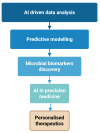Smart Microbiomes: How AI Is Revolutionizing Personalized Medicine
- PMID: 41007192
- PMCID: PMC12466996
- DOI: 10.3390/bioengineering12090944
Smart Microbiomes: How AI Is Revolutionizing Personalized Medicine
Abstract
Background: Recent studies have shown that gut microbiota have important roles in different human diseases. There has been an ever-increasing application of high-throughput technologies for the characterization of microbial ecosystems. This led to an explosion of various molecular profiling data, and the analysis of such data has shown that machine-learning algorithms have been useful in identifying key molecular signatures. Results: In this review, we first analyze how dysbiosis of the intestinal microbiota relates to human disease and how possible modulation of the gut microbial ecosystem may be used for disease intervention. Further, we introduce categories and the workflows of different machine-learning approaches and how they perform integrative analysis of multi-omics data. Last, we review advances of machine learning in gut microbiome applications and discuss challenges it faces. Conclusions: We conclude that machine learning is indeed well suited for analyzing gut microbiome and that these approaches are beneficial for developing gut microbe-targeted therapies, helping in achieving personalized and precision medicine.
Keywords: artificial intelligence; autoimmune diseases; chronic inflammation; gastrointestinal disorders; gut microbiota; machine learning; metabolic diseases; probiotics.
Conflict of interest statement
The authors declare no conflicts of interest.
Figures



References
Publication types
LinkOut - more resources
Full Text Sources

